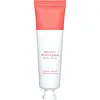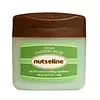What's inside
What's inside
 Key Ingredients
Key Ingredients

 Benefits
Benefits

 Concerns
Concerns

 Ingredients Side-by-side
Ingredients Side-by-side

Caprylic/Capric Triglyceride
MaskingHydroxystearic/Linolenic/Linoleic Polyglycerides
EmollientRicinus Communis Seed Oil
MaskingHelianthus Annuus Seed Oil
EmollientBeeswax
Emulsion StabilisingHydrogenated Castor Oil
EmollientHydrogenated Vegetable Oil
EmollientCopernicia Cerifera Wax
Euphorbia Cerifera Wax
Coptis Japonica Root Extract
Skin ConditioningCentella Asiatica Extract
CleansingPanthenol
Skin ConditioningTocopheryl Acetate
AntioxidantCurcuma Longa Root Extract
MaskingCeramide NP
Skin ConditioningMelia Azadirachta Flower Extract
Skin ConditioningCoccinia Indica Fruit Extract
Skin ConditioningCorallina Officinalis Extract
Skin Conditioning1,2-Hexanediol
Skin ConditioningOcimum Sanctum Leaf Extract
Skin ConditioningPantolactone
HumectantSolanum Melongena Fruit Extract
Skin ConditioningSymphytum Officinale Leaf Extract
Skin ConditioningButylene Glycol
HumectantAmber Powder
Water
Skin ConditioningMoringa Oleifera Seed Oil
EmollientHydrogenated Lecithin
EmulsifyingEucalyptus Globulus Leaf Oil
PerfumingCaprylic/Capric Triglyceride, Hydroxystearic/Linolenic/Linoleic Polyglycerides, Ricinus Communis Seed Oil, Helianthus Annuus Seed Oil, Beeswax, Hydrogenated Castor Oil, Hydrogenated Vegetable Oil, Copernicia Cerifera Wax, Euphorbia Cerifera Wax, Coptis Japonica Root Extract, Centella Asiatica Extract, Panthenol, Tocopheryl Acetate, Curcuma Longa Root Extract, Ceramide NP, Melia Azadirachta Flower Extract, Coccinia Indica Fruit Extract, Corallina Officinalis Extract, 1,2-Hexanediol, Ocimum Sanctum Leaf Extract, Pantolactone, Solanum Melongena Fruit Extract, Symphytum Officinale Leaf Extract, Butylene Glycol, Amber Powder, Water, Moringa Oleifera Seed Oil, Hydrogenated Lecithin, Eucalyptus Globulus Leaf Oil
Helianthus Annuus Seed Oil
EmollientButyrospermum Parkii Butter
Skin ConditioningCocos Nucifera Oil
MaskingEuphorbia Cerifera Wax
Hydrogenated Vegetable Oil
EmollientCopernicia Cerifera Wax
Camphor
MaskingCetyl Palmitate
EmollientSorbitan Olivate
EmulsifyingSorbitan Palmitate
EmulsifyingMacadamia Ternifolia Seed Oil
EmollientPrunus Amygdalus Dulcis Oil
Skin ConditioningEucalyptus Globulus Leaf Oil
PerfumingTocopherol
AntioxidantMentha Piperita Oil
MaskingRosmarinus Officinalis Leaf Oil
MaskingWater
Skin ConditioningButylene Glycol
HumectantCymbopogon Citratus Leaf Oil
MaskingLavandula Angustifolia Oil
MaskingMelia Azadirachta Leaf Extract
Skin ConditioningMelia Azadirachta Flower Extract
Skin ConditioningCentella Asiatica Extract
CleansingCoccinia Indica Fruit Extract
Skin ConditioningSolanum Melongena Fruit Extract
Skin ConditioningAloe Barbadensis Flower Extract
EmollientAmber Powder
Curcuma Longa Root Extract
MaskingOcimum Sanctum Leaf Extract
Skin ConditioningCorallina Officinalis Extract
Skin ConditioningGlycerin
HumectantMoringa Oleifera Seed Oil
EmollientSimmondsia Chinensis Seed Oil
Emollient1,2-Hexanediol
Skin ConditioningCaprylic/Capric Triglyceride
MaskingHydrogenated Phosphatidylcholine
EmulsifyingLaminaria Japonica Extract
Skin ProtectingUlmus Davidiana Root Extract
Skin ConditioningTriticum Vulgare Sprout Extract
Skin ConditioningBrassica Oleracea Italica Extract
AstringentSucrose Stearate
EmollientAloe Barbadensis Leaf Extract
EmollientBrassica Oleracea Capitata Leaf Extract
Skin ConditioningMedicago Sativa Extract
TonicViola Mandshurica Flower Extract
AntioxidantDioscorea Japonica Root Extract
Skin ConditioningRaphanus Sativus Seed Extract
Skin ConditioningBrassica Campestris Extract
Skin ConditioningCetearyl Alcohol
EmollientMadecassoside
AntioxidantMadecassic Acid
Skin ConditioningAsiaticoside
AntioxidantAsiatic Acid
Skin ConditioningLinalool
PerfumingLimonene
PerfumingCitral
PerfumingHelianthus Annuus Seed Oil, Butyrospermum Parkii Butter, Cocos Nucifera Oil, Euphorbia Cerifera Wax, Hydrogenated Vegetable Oil, Copernicia Cerifera Wax, Camphor, Cetyl Palmitate, Sorbitan Olivate, Sorbitan Palmitate, Macadamia Ternifolia Seed Oil, Prunus Amygdalus Dulcis Oil, Eucalyptus Globulus Leaf Oil, Tocopherol, Mentha Piperita Oil, Rosmarinus Officinalis Leaf Oil, Water, Butylene Glycol, Cymbopogon Citratus Leaf Oil, Lavandula Angustifolia Oil, Melia Azadirachta Leaf Extract, Melia Azadirachta Flower Extract, Centella Asiatica Extract, Coccinia Indica Fruit Extract, Solanum Melongena Fruit Extract, Aloe Barbadensis Flower Extract, Amber Powder, Curcuma Longa Root Extract, Ocimum Sanctum Leaf Extract, Corallina Officinalis Extract, Glycerin, Moringa Oleifera Seed Oil, Simmondsia Chinensis Seed Oil, 1,2-Hexanediol, Caprylic/Capric Triglyceride, Hydrogenated Phosphatidylcholine, Laminaria Japonica Extract, Ulmus Davidiana Root Extract, Triticum Vulgare Sprout Extract, Brassica Oleracea Italica Extract, Sucrose Stearate, Aloe Barbadensis Leaf Extract, Brassica Oleracea Capitata Leaf Extract, Medicago Sativa Extract, Viola Mandshurica Flower Extract, Dioscorea Japonica Root Extract, Raphanus Sativus Seed Extract, Brassica Campestris Extract, Cetearyl Alcohol, Madecassoside, Madecassic Acid, Asiaticoside, Asiatic Acid, Linalool, Limonene, Citral
Ingredients Explained
These ingredients are found in both products.
Ingredients higher up in an ingredient list are typically present in a larger amount.
1,2-Hexanediol is a synthetic liquid and another multi-functional powerhouse.
It is a:
- Humectant, drawing moisture into the skin
- Emollient, helping to soften skin
- Solvent, dispersing and stabilizing formulas
- Preservative booster, enhancing the antimicrobial activity of other preservatives
We don't have a description for Amber Powder yet.
Butylene Glycol (or BG) is used within cosmetic products for a few different reasons:
Overall, Butylene Glycol is a safe and well-rounded ingredient that works well with other ingredients.
Though this ingredient works well with most skin types, some people with sensitive skin may experience a reaction such as allergic rashes, closed comedones, or itchiness.
Learn more about Butylene GlycolThis ingredient is an emollient, solvent, and texture enhancer. It is considered a skin-softener by helping the skin prevent moisture loss.
It helps thicken a product's formula and makes it easier to spread by dissolving clumping compounds.
Caprylic Triglyceride is made by combining glycerin with coconut oil, forming a clear liquid.
While there is an assumption Caprylic Triglyceride can clog pores due to it being derived from coconut oil, there is no research supporting this.
Learn more about Caprylic/Capric TriglycerideCentella Asiatica Extract (Centella) is derived from an herb native to Southeast Asia. It is famous for its anti-inflammatory and soothing properties.
Centella is rich in antioxidants and amino acids, such as Madecassic Acid and Asiaticoside.
Studies show the compounds in centella help with:
The combination of all these properties makes centella effective at soothing, hydrating, and protecting the skin.
Other great components of centella include Vitamin A, vitamin C, several B vitamins, and Asiatic Acid.
Fun fact: Centella has been used as a medicine and in food for many centuries. As a medicine, it is used to treat burns, scratches, and wounds.
Learn more about Centella Asiatica ExtractCoccinia Indica Fruit Extract is also known as Ivy Gourd Fruit Extract. It has skin conditioning properties.
Copernicia Cerifera Wax comes from a palm tree native to Brazil; another name for this ingredient is Carnauba Wax.
This ingredient is used to thicken texture and also leaves behind a film when applied.
Fun fact: This wax has the highest melting point of all natural waxes and low solubility.
Learn more about Copernicia Cerifera WaxCorallina Officinalis Extract is from the red seaweed, Corallina Officinalis. This seaweed is found all over the world but is most common in the rocky shores of Great Britain and Ireland.
Corallina Officinalis Extract contains antioxidant and emollient properties.
Extracted polysaccharides, galactose and xylose, in red algae showed antioxidant activity. Antioxidants help with anti-aging by neutralizing free-radical molecules. Free-radical molecules may damage your skin cells and DNA. Galactose is also a PHA.
Corallina Officinalis is structurally similar to coral due to its high calcium content.
Learn more about Corallina Officinalis ExtractCurcuma Longa Root Extract is from the spice, turmeric. Besides being a healthy and delicious spice, turmeric also has plenty of skincare benefits. It has anti-inflammatory, antioxidant, and anti-microbial properties.
Turmeric contains curcumin, an antioxidant. Antioxidants help neutralize unstable free-radical molecules. Free-radical molecules may damage your skin's cells and DNA. Curcumin may help with anti-aging.
Curcumin also has anti-inflammatory properties and can help soothe skin and reduce irritation. On top of that, curcumin has been shown to help prevent hyperpigmentation from sun damage.
The anti-microbial property of turmeric can make it effective in treating acne. This property has also been shown to help regulate the production of sebum.
Learn more about Curcuma Longa Root ExtractThis oil is derived from the leaves of Eucalyptus Globulus, a type of Eucalyptus tree native to Australia.
Though this oil shows antibacterial and antioxidant activity, it is also a known skin-irritant due to its fragrance components.
Helianthus Annuus Seed Oil is the oil derived from the seeds of a Sunflower. Sunflower seed oil is non-fragrant. It is an emollient, meaning it helps to soften the skin.
Sunflower seed oil contains many fatty acids. The fatty acids found in sunflower seeds include (from highest amount to least): linoleic acid, myristic acid, palmitic acid, stearic acid, arachidic acid, oleic acid, and linolenic acid.
These fatty acids help the skin create ceramides. Ceramides play a role in repairing the skin barrier.
Helianthus Annuus Seed Oil helps moisturize the skin. This in turn helps the skin look more rejuvenated and smoother.
Sunflowers are rich in vitamin E.
Historians believe Indigenous cultures of North America domesticated sunflowers before corn. Thus they relied on sunflower oil for a variety of uses. One such use is moisturizing skin and hair.
Sunflower seed oil may not be fungal acne safe. We recommend speaking with a professional if you have any concerns.
Learn more about Helianthus Annuus Seed OilHydrogenated Vegetable Oil is created by adding hydrogen to vegetable oil in order to give it more stability. This process also raises the melting point of vegetable oil. In cosmetics, it is an emollient.
Emollients help soothe and soften the skin. They do this by creating a protective film on your skin. This barrier helps trap moisture and keeps your skin hydrated. Emollients may be effective at treating dry or itchy skin.
The term "Hydrogenated Vegetable Oil" is an umbrella term and can refer to a variety of vegetable oils and blends of: sunflower oil, soybean oil, olive oil, coconut oil, palm oil, and more.
Due to the differences in vegetables, the benefits may vary.
Learn more about Hydrogenated Vegetable OilMelia Azadirachta Flower Extract is from the Neem tree. Neem trees originate from India.
Melia Azadirachta Flower Extract contains antioxidants. Antioxidants help fight free-radicals. Free-radicals are molecules that may damage your skin cells, such as pollution.
The flowers of this tree are lilac colored.
Learn more about Melia Azadirachta Flower ExtractMoringa Oleifera Seed Oil is the oil expressed from the seeds of Moringa oleifera plant. It is more commonly known as Moringa seed oil.
Moringa seeds have antioxidant, anti-inflammatory, and skin hydrating properties. These seeds are rich in oils, proteins, monounsaturated fats, and tocopherols.
As an emollient, moringa seed oil helps trap moisture in the skin by creating a film on top. This helps keep your skin hydrated and soft.
Many compounds in moringa seed oil are antioxidant and anti-inflammatory. These compounds include Vitamin E. , catechins, ferulic acid, and more.
Another compound found in Moringa seed oil is oleic acid.
Moringa trees are native to the Himalayan mountains.
This ingredient may not be fungal-acne safe.
Learn more about Moringa Oleifera Seed OilOcimum Sanctum Leaf Extract comes from the Holy Basil plant. Holy Basil is native to India.
Holy Basil is rich in antioxidants due to its high romarinic acid, ferulic acid, and rutin content. This gives it skin brightening and soothing properties.
While Holy Basil has many claims to help fight acne, more research is needed.
One thing to note is the presence of tannins; tannins are naturally found in nature. However, this compound may be skin-sensitizing.
Learn more about Ocimum Sanctum Leaf ExtractWe don't have a description for Solanum Melongena Fruit Extract yet.
Water. It's the most common cosmetic ingredient of all. You'll usually see it at the top of ingredient lists, meaning that it makes up the largest part of the product.
So why is it so popular? Water most often acts as a solvent - this means that it helps dissolve other ingredients into the formulation.
You'll also recognize water as that liquid we all need to stay alive. If you see this, drink a glass of water. Stay hydrated!
Learn more about WaterEuphorbia Cerifera wax comes from a shrub in Northern Mexico. It is used to stabilize formulations and has emollient properties.
Emollients form a thin layer on top of skin to prevent water from evaporating, keeping skin and lips hydrated.
According to a manufacturer, this wax can range from a yellow/brown color to translucent.
Learn more about Euphorbia Cerifera Wax